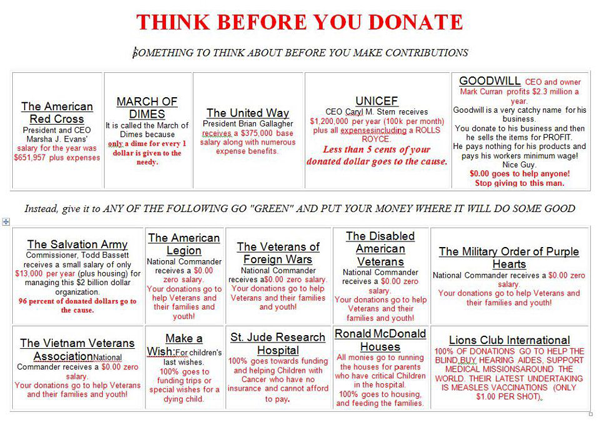 …but wise giving begins with research
…but wise giving begins with research
We received a fascinating email a couple weeks ago. You may think people working for charities are underpaid martyrs working selflessly for the causes they believe in, but “Think Before You Donate” tells a different story. It describes five “bad” national charities and the salaries of their CEOs, which range from $375,000 to $2.3 million annually. It then describes ten “good” national charities and the amount of donations that go to support their programs. This is typically the kind of story we are all over… corruption, abuse, cynicism, all wrapped up in a tidy little package. But things flowing through the InterTubes aren’t always what they seem, and a little investigation led to a slightly different story…
As it turns out, “Think Before You Donate” has been making the rounds of the Net for several years. It is popular enough that it was examined by Snopes.com, the internet debunking site, as well as several other sources. All the details are there if you want them, but here are the high points…
- The overall evaluation was that the info was “mostly outdated and inaccurate”
- The errors didn’t seem designed to falsely make a case one way or another. Here’s a few to give you an idea…
- UNICEF’s CEO’s yearly compensation was $472,891, not $1,200,000. UNICEF’s efficiency is 91%, not the 14% cited in the email. (More on efficiency ratings below)
- Red Cross’ CEO compensation was $1,037,000, not the reported $561,000.
- United Way’s CEO is compensated at $717,076, not $375,000.
- The National Commander of the American legion receives around $50,000, considerably more than the $0 reported.
- The Disabled American Veterans’ CEO received $323,252, again more than $0
They listed many more inconsistencies along those lines, but the gist of the email was to encourage people to support charities that put donations toward their basic cause and not to lavish compensation. So how do you tell if the charity you want to support is spending your money responsibly? Snopes went on to tell us about charitable efficiency ratings, which is the percentage of donations used to support program activities rather than organizational overhead. There are several groups that make it their business to evaluate charitable efficiency…
- Charity Navigator may be the most prominent rating agency, evaluating efficiency, transparency, and accountability. Their website includes advisory lists, top-10 lists related to charitable giving, and many tips for wise charitable giving.
- GuideStar rates and analyzes many aspects of non-profits, including their efficiency.
- Forbes Magazine has a report on the 200 Largest U.S. Charities, including efficiency ratings.
- The Better Business Bureau has a Wise Giving Alliance concentrating on charity ratings. You can also check out many charities on their basic website.
- The IRS also has a list of approved charities.
And of course, there is someone out there watching the watchers. If you want to know about the methodologies and effectiveness of the charitable ratings agencies themselves, click here or here.
The takeaway from all these rating agencies is that you should try to give to the groups that stretch your money the farthest, and these agencies can give you some guidance about which ones they are. But we have a little more to add. Instead of giving to big charitable groups, we recommend finding the small non-profit groups active in your community. We try to seek some out in our annual Charitable Giving Calendar and Willamette Week has their annual Give Guide issue, but your friends and family may be even better sources. Most of these small groups are too small to be rated by the charity watchdogs but you’ll have a good chance at seeing how the group works up-close, and won’t need to rely on a third party evaluation. Also, most community groups operate on a shoestring budget with many of their personnel working free or cheap, so they may appreciate your donation more than the big guys.
The absolute best way to ensure your donation is used to its fullest potential is to donate your time, not your money, to causes you believe in. Many groups actually need people more than cash, and if you work with a group you not only help them then, but you become an ambassador for the group in the larger community. And in the end, this is the only way to be absolutely assured that 100% of your donation actually gets to the cause!











